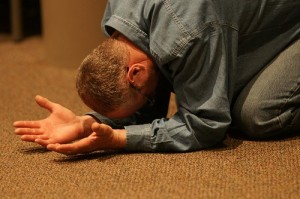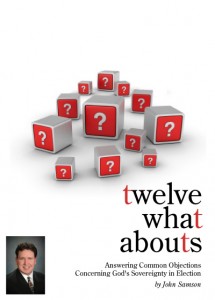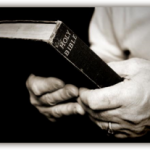 In the 1990s Pastor Jim Cymbala’s oldest daughter Chrissy was far from God, and had been for two and half years. In Fresh Fire, Jim tells the story of what happened.
In the 1990s Pastor Jim Cymbala’s oldest daughter Chrissy was far from God, and had been for two and half years. In Fresh Fire, Jim tells the story of what happened.
February came. One cold Tuesday night during the prayer meeting, I talked from Acts 4 about the church boldly calling on God in the face of persecution. We entered into a time of prayer, everyone reaching out to the Lord in concert together.
An usher handed me a note. A young women whom I felt to be spiritually sensitive had written: Pastor Cymbala, I feel impressed that we should stop the meeting and all pray for your daughter.
I hesitated. Was it right to change to flow of the service and focus on my personal need?
Yet something in the note seemed to ring true. In a few minutes I picked up the microphone and told the congregation what had just happened. “The truth of the matter,” I said, “although I haven’t talked much about it, is that my daughter is very far from God these days. She thinks up is down, and down is up; dark is light, and light is dark. But I know God can break through to her, and so I’m going to ask Pastor Boekstaaf to lead us in praying for Chrissy. Let’s all join hands across the sanctuary.”
As my associate began to lead the people, I stood behind him with my hand on his back. My tear ducts had run dry, but I prayed as best I knew.
To describe what happened in the next minutes, I can only employ a metaphor: The church turned into a labor room. The sounds of women giving birth are not pleasant, but the results are wonderful. Paul knew this when he wrote, “My dear children, for whom I am again in the pains of childbirth until Christ is formed in you . . .” (Gal. 4:19).
There arose a groaning, a sense of desperate determination, as if to say, “Satan, you will not have this girl. Take your hands off her, she’s coming back!” I was overwhelmed. The force of that vast throng calling on God almost literally knocked me over.
When I got home that night, Carol was waiting up for me. We sat at the kitchen table drinking coffee, and I said, “It’s over.”
“What’s over?” she wondered.
“It’s over with Chrissy. You would have had to be in the prayer meeting tonight. I tell you, if there’s a God in heaven, this whole nightmare is finally over.” I described what had taken place.
Thirty-two hours later, on Thursday morning, as I was shaving, Carol suddenly burst through the door, her eyes wide. “Go downstairs!” she blurted. “Chrissy’s here.”
“Chrissy’s here?”
“Yes, Go down!”
“But Carol–I–”
“Just go down,” she urged, “It’s you she wants to see.”
I wiped off the shaving cream and headed down the stairs, my heart pounding. As I came around the corner, I saw my daughter on the kitchen floor, rocking on her hands and knees, sobbing. Cautiously I spoke to her name:
“Chrissy?”
She grabbed my pant leg and began pouring out her anguish. “Daddy, Daddy. I’ve sinned against God. I’ve sinned against myself. I’ve sinned against you and Mommy. Please forgive me.”
My vision was clouded by tears I pulled her up from the floor and held her close as we cried together. Suddenly she drew back. “Daddy,” she said with a start, “Who was praying for me? Who was praying for me?” Her voice was like that of a cross-examining attorney.
“What do you mean, Chrissy?”
“On Tuesday night, daddy–who was praying for me?” I didn’t say anything, so she continued:
“In the middle of the night, God woke me up and showed me I was heading toward this abyss. There was no bottom to it–it scared me to death. I was so frightened. I realized how hard I’ve been, how wrong, how rebellious. But at the same time, it was like God wrapped his arms around me and held me tight. He kept me from sliding any farther as he said, I still love you. Daddy, tell me the truth–who was praying for me Tuesday night?”

 Back in June I was interviewed by Pastor Kevin Boling about my new book “Twelve What Abouts” on the “Knowing the Truth” Radio broadcast. The 50,000 watt radio station originates in Greenville, covering all of South Carolina and parts of North Carolina, Tennessee and Georgia.
Back in June I was interviewed by Pastor Kevin Boling about my new book “Twelve What Abouts” on the “Knowing the Truth” Radio broadcast. The 50,000 watt radio station originates in Greenville, covering all of South Carolina and parts of North Carolina, Tennessee and Georgia. Though this debate took place almost 19 years ago now, the fact is that the word of God has not changed in any way at all in that time. On September 28, 1993, at the Bayview Orthodox Presbyterian Church in Chula Vista, California, Dr. James White debated Roman Catholic Patrick Madrid on the subject “Does The Bible Teach Sola Scriptura?” The full transcript of the debate can be found
Though this debate took place almost 19 years ago now, the fact is that the word of God has not changed in any way at all in that time. On September 28, 1993, at the Bayview Orthodox Presbyterian Church in Chula Vista, California, Dr. James White debated Roman Catholic Patrick Madrid on the subject “Does The Bible Teach Sola Scriptura?” The full transcript of the debate can be found